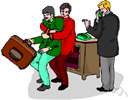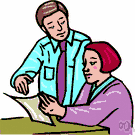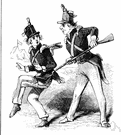bother
Also found in: Thesaurus, Idioms.
both·er
(bŏth′ər)v. both·ered, both·er·ing, both·ers
v.tr.
1. To cause to be irritated, especially by repeated acts; trouble or annoy: "I spoke French badly. So I always replied to him in English. This didn't bother him" (Paul Theroux). See Synonyms at annoy.
2. To make agitated or perplexed; upset: "Jerry could see ... how much the doctor had been bothered by the failure of the first surgery" (Rick Bass).
3. To intrude on without warrant or invitation; disturb: "When I saw him slumped in a chair, deep in thought, I decided not to bother him" (Pat Toomay).
4. To give discomfort or pain to: a back condition that bothers her constantly.
5. To take the trouble (to do something); concern oneself with (accomplishing something): "Most people [with the syndrome] have such mild symptoms that they never bother to see a doctor" (Jane E. Brody).
v.intr.
To take trouble; concern oneself: "old, hard-to-reach coal seams that were too complex or dangerous for other coal companies to bother with" (Jeff Goodell).
n.
A cause or state of disturbance.
interj.
Used to express annoyance or mild irritation.
[Probably from dialectal bodder, possibly of Celtic origin.]
American Heritage® Dictionary of the English Language, Fifth Edition. Copyright © 2016 by Houghton Mifflin Harcourt Publishing Company. Published by Houghton Mifflin Harcourt Publishing Company. All rights reserved.
bother
(ˈbɒðə)vb
1. (tr) to give annoyance, pain, or trouble to; irritate: his bad leg is bothering him again.
2. (tr) to trouble (a person) by repeatedly disturbing; pester: stop bothering your father!.
3. (intr) to take the time or trouble; concern oneself: don't bother to come with me.
4. (tr) to make (a person) alarmed or confused: the thought of her husband's return clearly bothered her.
n
5. a state of worry, trouble, or confusion
6. a person or thing that causes fuss, trouble, or annoyance
7. informal a disturbance or fight; trouble (esp in the phrase a spot of bother)
interj
chiefly Brit an exclamation of slight annoyance
[C18: perhaps from Irish Gaelic bodhar deaf, vexed; compare Irish Gaelic buairim I vex]
Collins English Dictionary – Complete and Unabridged, 12th Edition 2014 © HarperCollins Publishers 1991, 1994, 1998, 2000, 2003, 2006, 2007, 2009, 2011, 2014
both•er
(ˈbɒð ər)v.t.
1. to give trouble to; annoy; pester: Noise bothers me.
2. to bewilder; confuse: His inability to get the joke bothered him.
3. to worry; distress: It bothers us that she is so careless.
v.i. 4. to take the trouble; trouble or inconvenience oneself: Don't bother to call.
n. 5. something or someone troublesome or burdensome.
6. effort, work, or worry: Gardening takes more bother than it's worth.
7. a worried or perplexed state: Don't get into such a bother about small matters.
[1710–20; orig. Hiberno-E]
syn: bother, annoy, plague imply persistent interference with one's comfort or peace of mind. To bother is to cause irritation or weariness, esp. by repeated interruptions in the midst of pressing duties: Don't bother me while I'm working. To annoy is to cause mild irritation or mental disturbance, as by repetition of an action that displeases: The dog's constant barking annoyed the neighbors. To plague is to trouble or bother, but usu. connotes severe mental distress: The family was plagued by lack of money.
Random House Kernerman Webster's College Dictionary, © 2010 K Dictionaries Ltd. Copyright 2005, 1997, 1991 by Random House, Inc. All rights reserved.
bother
Past participle: bothered
Gerund: bothering
| Imperative |
|---|
| bother |
| bother |
Collins English Verb Tables © HarperCollins Publishers 2011
ThesaurusAntonymsRelated WordsSynonymsLegend:
Switch to new thesaurus
| Noun | 1. |  bother - an angry disturbance; "he didn't want to make a fuss"; "they had labor trouble"; "a spot of bother" bother - an angry disturbance; "he didn't want to make a fuss"; "they had labor trouble"; "a spot of bother"disturbance, perturbation - activity that is a malfunction, intrusion, or interruption; "the term `distress' connotes some degree of perturbation and emotional upset"; "he looked around for the source of the disturbance"; "there was a disturbance of neural function" |
| 2. |  bother - something or someone that causes trouble; a source of unhappiness; "washing dishes was a nuisance before we got a dish washer"; "a bit of a bother"; "he's not a friend, he's an infliction" bother - something or someone that causes trouble; a source of unhappiness; "washing dishes was a nuisance before we got a dish washer"; "a bit of a bother"; "he's not a friend, he's an infliction"negative stimulus - a stimulus with undesirable consequences nuisance - (law) a broad legal concept including anything that disturbs the reasonable use of your property or endangers life and health or is offensive plague - an annoyance; "those children are a damn plague" | |
| Verb | 1. |  bother - take the trouble to do something; concern oneself; "He did not trouble to call his mother on her birthday"; "Don't bother, please" bother - take the trouble to do something; concern oneself; "He did not trouble to call his mother on her birthday"; "Don't bother, please" |
| 2. |  bother - cause annoyance in; disturb, especially by minor irritations; "Mosquitoes buzzing in my ear really bothers me"; "It irritates me that she never closes the door after she leaves" bother - cause annoyance in; disturb, especially by minor irritations; "Mosquitoes buzzing in my ear really bothers me"; "It irritates me that she never closes the door after she leaves"get under one's skin, get - irritate; "Her childish behavior really get to me"; "His lying really gets me" eat into, rankle, grate, fret - gnaw into; make resentful or angry; "The injustice rankled her"; "his resentment festered" chafe - feel extreme irritation or anger; "He was chafing at her suggestion that he stay at home while she went on a vacation" peeve - cause to be annoyed, irritated, or resentful ruffle - trouble or vex; "ruffle somebody's composure" fret - cause annoyance in beset, chevvy, chevy, chivvy, chivy, harass, harry, hassle, molest, plague, provoke - annoy continually or chronically; "He is known to harry his staff when he is overworked"; "This man harasses his female co-workers" antagonize, antagonise - provoke the hostility of; "Don't antagonize your boss" displease - give displeasure to | |
| 3. |  bother - to cause inconvenience or discomfort to; "Sorry to trouble you, but..." bother - to cause inconvenience or discomfort to; "Sorry to trouble you, but..." | |
| 4. | bother - intrude or enter uninvited; "Don't bother the professor while she is grading term papers" | |
| 5. | bother - make nervous or agitated; "The mere thought of her bothered him and made his heart beat faster" charge up, commove, agitate, rouse, excite, turn on, charge - cause to be agitated, excited, or roused; "The speaker charged up the crowd with his inflammatory remarks" bother - make confused or perplexed or puzzled | |
| 6. | bother - make confused or perplexed or puzzled disconcert, flurry, confuse, put off - cause to feel embarrassment; "The constant attention of the young man confused her" bother - make nervous or agitated; "The mere thought of her bothered him and made his heart beat faster" |
Based on WordNet 3.0, Farlex clipart collection. © 2003-2012 Princeton University, Farlex Inc.
bother
verb
1. concern yourself, take the time, make the effort, go to the trouble, trouble yourself, burden yourself, inconvenience yourself Most of the papers didn't even bother reporting it.
2. trouble, concern, worry, upset, alarm, disturb, distress, annoy, dismay, gall, disconcert, vex, perturb, faze, put or get someone's back up That kind of jealousy doesn't bother me.
3. pester, plague, irritate, put out, harass, nag, hassle (informal), inconvenience, molest, breathe down someone's neck, get on your nerves (informal), nark (Brit., Austral., & N.Z. slang), bend someone's ear (informal), give someone grief (Brit. & S. African), get on your wick (Brit. slang) I don't know why he bothers me with this kind of rubbish.
pester help, support, further, aid, assist, relieve, facilitate, succour
pester help, support, further, aid, assist, relieve, facilitate, succour
noun
1. trouble, problem, worry, difficulty, strain, grief (Brit. & S. African), fuss, pest, irritation, hassle (informal), nuisance, flurry, uphill (S. African), inconvenience, annoyance, aggravation, vexation Most men hate the bother of shaving.
trouble use, help, service, benefit, aid, advantage, comfort, convenience
trouble use, help, service, benefit, aid, advantage, comfort, convenience
Collins Thesaurus of the English Language – Complete and Unabridged 2nd Edition. 2002 © HarperCollins Publishers 1995, 2002
bother
verbnoun
1. Something that annoys:
2. The feeling of being annoyed:
3. Needless trouble:
The American Heritage® Roget's Thesaurus. Copyright © 2013, 2014 by Houghton Mifflin Harcourt Publishing Company. Published by Houghton Mifflin Harcourt Publishing Company. All rights reserved.
TranslationsSelect a language:
Spanish / Español
bother
[ˈbɒðəʳ]A. N
1. (= nuisance) → molestia f, lata f
what a bother! → ¡qué lata!
it's such a bother to clean → es una lata limpiarlo, es muy incómodo limpiarlo
what a bother! → ¡qué lata!
it's such a bother to clean → es una lata limpiarlo, es muy incómodo limpiarlo
2. (= problems) → problemas mpl
I found the street without any bother → encontré la calle sin problemas
do you have much bother with your car? → ¿tienes muchos problemas con el coche?
he had a spot of bother with the police → tuvo un pequeño problema con la policía
I found the street without any bother → encontré la calle sin problemas
do you have much bother with your car? → ¿tienes muchos problemas con el coche?
he had a spot of bother with the police → tuvo un pequeño problema con la policía
B. VT
C. VI (= take trouble) → tomarse la molestia (to do de hacer) to bother about/with → molestarse or preocuparse por
don't bother → no te molestes, no te preocupes
he didn't even bother to write → ni siquiera se molestó en escribir
don't bother → no te molestes, no te preocupes
he didn't even bother to write → ni siquiera se molestó en escribir
D. EXCL → ¡porras!
Collins Spanish Dictionary - Complete and Unabridged 8th Edition 2005 © William Collins Sons & Co. Ltd. 1971, 1988 © HarperCollins Publishers 1992, 1993, 1996, 1997, 2000, 2003, 2005
bother
(ˈboðə) verb1. to annoy or worry. The noise bothered the old man.molestar
2. to take the trouble. Don't bother to write – it isn't necessary.molestarse
noun1. trouble, nuisance or worry. molestia
2. something or someone that causes bother. What a bother all this is!molestia; incomodidad
ˈbothersome adjective causing bother or annoyance. a bothersome cough.fastidioso
Kernerman English Multilingual Dictionary © 2006-2013 K Dictionaries Ltd.
bother
→ molestar , molestarseMultilingual Translator © HarperCollins Publishers 2009
Collins Multilingual Translator © HarperCollins Publishers 2009
bother
vt molestar; Is your neck bothering you?..¿Le molesta el cuello?English-Spanish/Spanish-English Medical Dictionary Copyright © 2006 by The McGraw-Hill Companies, Inc. All rights reserved.